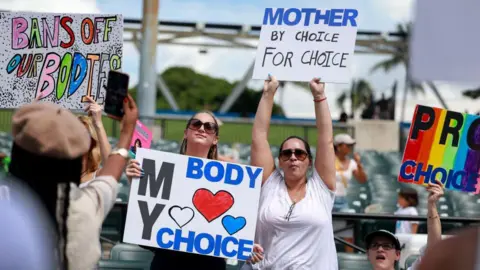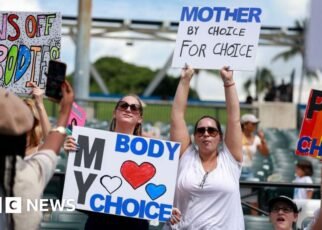[ad_1]
 Getty Images
Getty ImagesOn Tuesday, Betsy Linkhorst, 18, will cast her very first vote not just for who should be in the White House, but on the issue of abortion.
Her home state of Florida is one of 10 across the country that will have abortion on the ballot this election.
If passed, Florida’s measure – Amendment 4 – would overturn the six-week abortion ban currently in effect here and expand access to the point of foetal viability, which is about 24 weeks of pregnancy. It could also be later “when necessary to protect the patient’s health”, according to the measure’s wording.
Ms Linkhorst, who said she was “nervous” about living in a state with limited abortion access, told the BBC she was going to vote yes.
“It’s important to vote based on our rights,” she said of her vote both for Kamala Harris and for expanding abortion access in Florida. “I don’t think it’s the government’s right to police women’s bodies.”
Of all the abortion measures on the ballot this week, Florida’s ballot question will be the most closely watched.
The state was, for over a year, one of the last places that women in the southern part of the country could get a legal abortion, up to 15 weeks. But in May, Florida enacted an even more restrictive law, which banned abortions after six weeks – with few exceptions – which is before most women know they are pregnant.
Polls suggest a majority of Florida voters are backing Amendment 4. But the amendment must reach a 60% threshold to pass – and surveys are indicating that while it has strong support, the campaign might not quite meet that bar in the fairly conservative state.
If it did pass, that would be viewed as a huge victory for the abortion-rights movement.
“It’s the hardest place in the country to win,” said Kelly Hall, a strategist who works on abortion rights ballot measures and executive director of the Fairness Project. “If we overcome that particular barrier, there’s absolutely nothing holding us back from passing ballot measures everywhere it’s legal.”
This is the first presidential election held since the US Supreme Court overturned Roe v Wade, giving states the right to regulate abortion themselves. Since then, 17 states have enacted bans that restrict nearly all abortions within their borders.
During the 2022 midterms, held months after the top court’s decision, voters in conservative states Kentucky and Kansas voted against restricting abortion, sending a message that access to the procedure is broadly supported by the American people. The issue is also credited with helping the Democrats do better than expected in congressional races.
Now, Democrats hope again that abortion measures in key battleground states like Arizona and Nevada will drive their voters to the polls to back abortion rights – and while they’re at it, propel Vice-President Harris to the White House and their down-ballot candidates to victory.
In a sign of how salient the issue of abortion has been for voters, Republican White House nominee Donald Trump, a resident of Florida, has tried to back away from his once-hardline stance against abortion. Now, he says he thinks the decision on how it should be regulated ought to be left up to states, and voters.
Last August in an interview with NBC, he seemed to indicate he would vote in favour of Amendment 4. But after outcry from his anti-abortion supporters, he said he would vote against it.

The issue is divisive in the Republican-leaning state.
Nancy Collins, 88, had voted no on Amendment 4 due to her Catholic faith.
“I’ve always been anti-abortion,” she said. “It’s against my religion.”
Ms Collins supported Trump’s current position that abortion policy should be left to individual states, and she hoped Florida would reject any expansion beyond its current six-week ban.
Florida’s Governor Ron DeSantis has also marshalled the powers of his state government to beat back the measure.
He says the measure would allow children to get abortions without parental consent, something Amendment 4’s backers reject.
Last month he said the amendment would make “make Florida one of the most radical abortion jurisdictions not just in the United States but anywhere in the world”.
The state’s health department also launched a website opposing Amendment 4. And in October, a judge overturned the health department’s attempts to block a television station from airing an ad in support of Amendment 4.
Abortion measures are not guaranteed to deliver Harris, or other Democratic politicians, the boost they hope to see this year in contested races.
In Florida, which Trump won handily in 2016 and 2020, he is widely expected to win another victory.
A New York Times/Siena College poll suggested that 12% of voters in Arizona and Florida would vote for Trump as well as an abortion rights measure.
Jonel Jones, 37, is a former Democrat who decided to vote for Trump this year. She had been looking for a job for months, and felt the former president had a stronger handle on the economy and could potentially improve her prospects.
She personally did not believe in abortion, she said. But she had read stories from other states like Georgia and Texas about pregnant women who became sick or died after being denied abortion or miscarriage treatment, and did not want a similar situation in Florida.
“I don’t think it’s right,” Ms Jones said.
After ticking the box for Donald Trump, she voted “yes” on Amendment 4.
[ad_2]
Source link freeslots dinogame telegram营销




